
We have another “THR Superstar” for you!
This time it is the very well respected Dr Colin Mendelsohn MB BS (Hons) who is an excellent harm reduction advocate.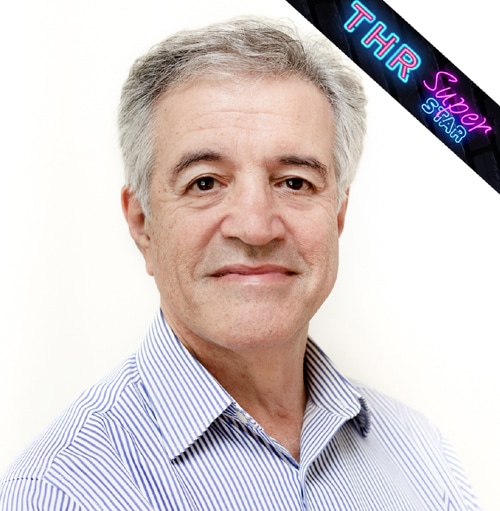
The reason for the THR Superstar series is to celebrate those who work tirelessly for those who use safer nicotine products and fight for our rights.
I am sure you will agree that Colin is definitely in that category!
Tell me a little about your life and career so far…
I am a retired Australian academic and medical practitioner with a special interest in smoking for over 40 years (yes, I am very old!) and more recently vaping. I became interested in smoking early in my career when asked to help in a smoking cessation training workshop for GP’s and have been addicted to smoking ever since! But seriously, my father and wife’s father both died of cancer from smoking, so I was already concerned about how I could help smokers quit.
However, even as a smoking specialist, most of my smoking patients could not quit. This was incredibly discouraging to patients, but also to me! I was supposed to be an expert. When I started to hear about vaping around 2015 and saw how it could help addicted smokers, I went to the UK and met with Professor Peter Hajek, Martin Dockrell and Clive Bates who confirmed my impression that vaping had huge potential to help smokers quit. I also met with Gerry Stimson on a visit to Australia and that really helped to lock me in.
I have been following the scientific research very closely since then and have treated thousands of smokers with vaping, with considerable success.
However, vaping is almost universally opposed in Australia and harshly restricted. In 2017, several colleagues and I established the Australian Tobacco Harm Reduction Association (ATHRA), a health promotion charity dedicated to sharing accurate information about vaping and tobacco harm reduction and advocating for sensible vaping law reform.
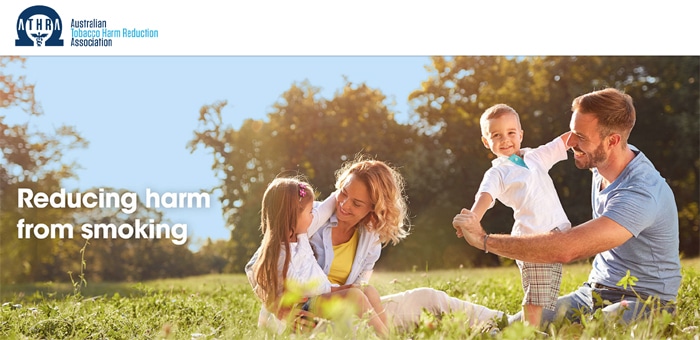
My single-minded mission (obsession) over the last eight years has been to advocate for vaping and sensible regulation in Australia and other countries.
Have you been a smoker? If so how long did you smoke for?
My only smoking experience was to puff on a cigarette butt left on the ground by my father. Fortunately, it didn’t take and I have not smoked since. However, I have enormous empathy for smokers. Most regretted ever starting and would dearly love to quit but are simply not able to do so, in spite of repeated attempts. Apart from being deadly, smoking is stigmatised and a dreadful waste of money.
Do you vape?
I have never vaped. However, I do sometimes suck a nicotine lozenge when I have to concentrate hard and I find that helps. We know nicotine has many positive effects including improved cognitive function, and does little harm, so I am comfortable doing that.
If I was going to vape, I would probably choose a high-quality pod device, such as Relx or Wild by Instinct. Both have very low levels of harmful emissions and are likely to cause little harm. They are also discreet and very easy to use. I have a sweet tooth, so would probably vape a sweet flavour such as Butterscotch or Vanilla.
How did vaping change your life?
I have to admit that I have become obsessed with vaping. I have retired as a doctor, but still spend most of my time on advocacy, research, writing articles and teaching about vaping. My wife says I am married to my computer as well as her! She also says I work too hard, and she is right again on that too.
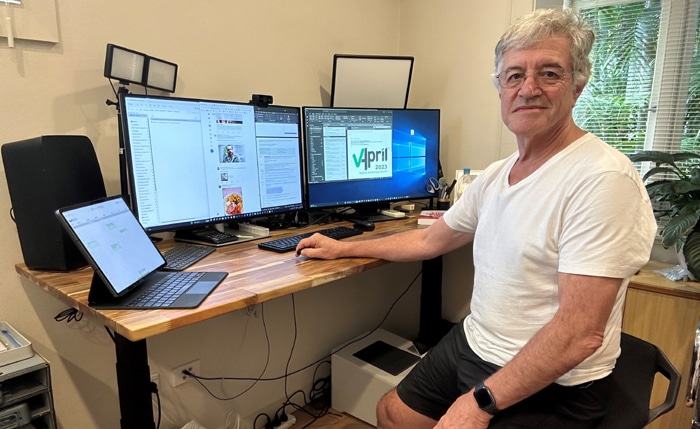
As a doctor, it is clear to me that the most effective thing I can do to improve society is to help someone stop smoking. Smoking is deadly and expensive, especially in Australia where we have the highest prices in the world. A pack of 20 of the leading brand costs AUD 40 compared to AUD 25 in the UK. Vaping is the most effective and most popular quitting aid. If I can make an impact on having vaping accepted in Australia, I will save more lives than I have in 40 year of medical practice. I will also save people a lot of money.
What is your current role in advocacy?
I work with closely with my colleague Dr Alex Wodak. Alex is an international legend in drug harm reduction and has played a key role in Australia and internationally in the introduction of Medically Supervised Injecting Rooms, needle exchange programs and drug law reform. I have learnt a lot from Alex and we make a great team.
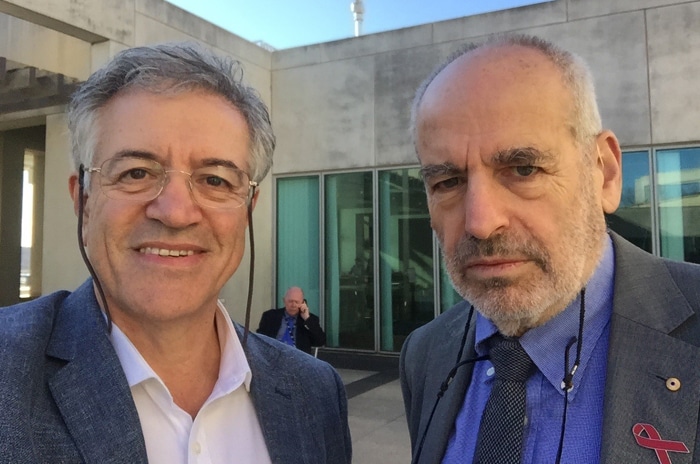
Vaping regulations are in the hands of key policymakers, particularly politicians. We spend a lot of our time meeting with state and federal politicians to educate them and push for sensible vaping law reform. I prepare a regular newsletter which goes out to members of all the Australian parliaments.
I also do a lot of media work, writing opinion pieces, letters to the editor of newspapers and radio and media interviews. This is important to win the hearts and minds of the public as this will influence politicians who are driven by public opinion.
Click below to watch Colin Mendelsohn slam the Australian health minister over vaping misinformation
Got a spare minute or two? Check out our GFN•TV shorts on Youtube for bitesize chunks of exclusive interviews with the best minds in THR!https://t.co/QNEDEvf4WA
— Global Forum on Nicotine (@GFNicotine) September 21, 2023
Alex and I make submissions to government enquiries and health organisations and write reports on vaping for various stakeholders.
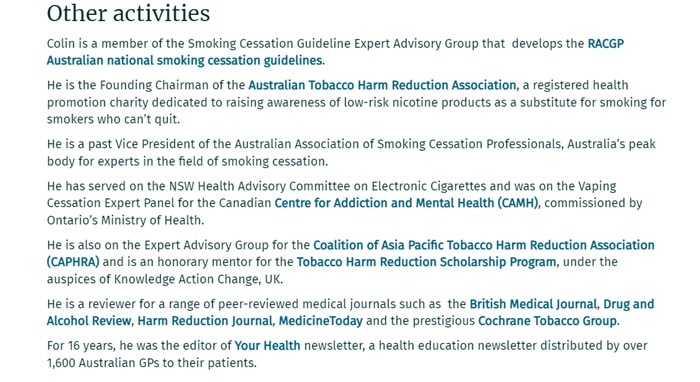
What I enjoy most though is studying the medical research on vaping. I try to keep up with all the latest evidence so I can share this with the media and other stakeholders. The misinformation on vaping and nicotine by the public and health ‘experts’ is breathtaking and needs to be regularly corrected.
We now have robust scientific evidence that #vaping, while not risk-free, carries only a tiny fraction of the cancer risk of smoking
Quitting smoking is best. If you can’t quit, switching to vaping will dramatically reduce your cancer riskhttps://t.co/7h9ECWRyzG…
— Dr Colin Mendelsohn (@ColinMendelsohn) September 24, 2023
What is the biggest challenge you face as a vaping advocate?
I find it incredibly frustrating. The science is now clear that vaping is the most effective quitting aid for adult smokers and carries only a small fraction of the risk of smoking.
However, there is almost universal opposition to vaping in Australia, largely based on scaremongering and misinformation. Vaping is opposed by all nine health departments, all health charities, public health organisations and all but one medical associations. Views and vaping on are being driven by everything but the science. Vaping is opposed for ideological and political reasons, because of vested and financial interests and moral values. Authorities seem to have very little empathy for smokers and the huge potential that vaping could have for public health.
Australia has gone from being a world leader in Tobacco Control to a world loser and this is likely to continue for some time
A rational approach to #vaping and tobacco harm reduction could help us get back on track
My interview with @2FIRSTS at #GTNF 23https://t.co/N6oQNepQuD…— Dr Colin Mendelsohn (@ColinMendelsohn) September 22, 2023
Even Australia’s peak health and medical research organisation, the National Health and Medical Research Centre has drunk the anti-vaping cool aid and opposes vaping. I publicly resigned from the Australian Medical Association because of their unscientific views on vaping.
Vaping opponents exaggerate the risks of vaping, ignore the compelling evidence and refuse to engage with pro-vaping experts, a sure sign they know that they are defending the indefensible.
The Minister for Health @Mark_Butler_MP is on a mission this week, waging a war on #vaping in an effort to “make Australia great again” in the field of tobacco control
I fact check his claims and find that the first casualty in this war is truthhttps://t.co/3wnpBIZfRI…
— Dr Colin Mendelsohn (@ColinMendelsohn) September 13, 2023
What is your biggest frustration as an advocate?
As Australia’s most vocal advocate, I am frequently smeared and subjected to relentless nasty, personal attacks. I am regularly accused of being funded by Big Tobacco or the vaping industry. However, all my advocacy is at my own expense. I have never received any funding from tobacco or e-cigarette companies. When I was younger, this would have been unbearable. Now it only makes me more determined.
Simon’s obsession with me continues with another pet name:
“Tobacco and vaping conference globe-trotter Colin Mendelsohn”I don’t follow Simon, but Maurice felt it was important to let me know that Simon had written about me and @AlexWodak. How sweet!https://t.co/oZZxf7gi6Q pic.twitter.com/c3wSRIAsEP
— Dr Colin Mendelsohn (@ColinMendelsohn) September 26, 2023
I am also incredibly disappointed that so many of Australia’s elite health bodies oppose vaping in spite of the evidence supporting it. So many of the organisations I had previously respected are stubbornly stuck in a parallel universe where science no longer seems to matter. They just keep digging deeper holes.
What current projects / campaigns are you working on?
My main focus at present is reform of the Australian vaping regulations. Australia’s regulatory model is a ‘de facto’ ban and has predictably been a resounding failure. Vapers are required to have a nicotine prescription from a doctor to vape and can then legally buy nicotine from a pharmacy or from overseas. However very few doctors will write scripts and very few pharmacists stock nicotine. Consumers have also rejected the prescription model and only 8% have a prescription.
As we predicted, the ‘ban’ has created a thriving black-market controlled by criminal gangs. Over 90 million illegal, dodgy, unregulated vapes are imported from China each year and sold freely to adults and children from retail outlets, social media and online. This has led to high youth vaping rates, and criminal groups now control the market, with regular reports of fire-bombings of shops, gang wars and murders. It’s appalling.
The Health Minister’s solution is to double down on the ban, increase policing and border protection, ban disposables and flavours. It won’t work and things will only get worse. The only way to eliminate a black market is to replace it with a legal, regulated market. I see Australia’s vaping model as a slow, inevitable train-wreck for the near future.
The crackdown on #vaping by @NSWHealth will only push black market supplies underground
It is time to sell regulated products from licensed retail outlets to help adult smokers quit and toyouth access
My interview on @ABC Illawarra
Listenhttps://t.co/j29gpbLJkk pic.twitter.com/M0YbBckkpw
— Dr Colin Mendelsohn (@ColinMendelsohn) September 28, 2023
End of rant.
What do you feel needs to change regarding tobacco harm reduction worldwide?
It’s simple. We need to follow the evidence. We need brave policymakers to call out the lies and agendas of anti-vaping organisations and develop evidence-based risk-proportionate regulation with accurate risk communication so that vaping can help the millions of smokers who need it.
Alex is a veteran of many drug harm reduction campaigns over the last 40 years. He repeatedly says that all campaigns faced ferocious resistance for some years, as they challenge the status quo. This has included Medically Supervised Injecting Rooms, condoms to prevent HIV and pill testing. Over time they start being accepted. Years later we look back and see how effective they are and wonder why we didn’t introduce them earlier.
How safe is #vaping and is it an effective quitting aid?@alexwodak and I gave a talk today at Grand Rounds at St Vincents’ Hospital, Sydney
Vaping poses only a small fraction of the risk of smoking and is more effective than #NRT. The latest evidence
https://t.co/03INtAvn9z…
— Dr Colin Mendelsohn (@ColinMendelsohn) August 22, 2023
I know we are on the right side of history and that keeps me going, but it is incredibly frustrating sometimes.
Any countries you feel are succeeding in THR?
The UK and New Zealand have the best regulatory models for vaping in my opinion. This involves selling strictly regulated nicotine vapes as adult consumer products from licensed retail outlets with stringent age verification, like cigarettes and alcohol. Vapes are subject to sensible risk-proportionate regulation and low levels of taxation. It’s not perfect, but it’s working far better than the draconian Australian model.
In both countries we are seeing accelerated declines in both youth and adult smoking as smokers switch to vaping. That is a huge public health win.
How would you advise vapers to get involved and stand up for their rights?
Even in the UK, there is some pushback against vaping. There is talk about banning single use disposables and there are any number of anti-vaping zealots who are quick to provide clickbait for the media.
Vapers need to be actively engaged, supporting NNA UK, responding to Parliamentary Inquiries, writing letters to editors or ringing in on talkback radio. Share your lifesaving stories with MPs, your doctors and other people in the community. If you don’t advocate for yourself, do it for loved ones and friends who still smoke. Gains that are lost will be hard to get back.
Have you ever been “star struck” meeting people who you admire – so who?
Clive Bates is my hero. Clive is based in England and is the leading vaping advocate globally. He has probably done more to advance the cause of vaping than anyone else. He is incredibly smart, hard working, articulate and well informed. He writes an outstanding blog, called the Counterfactual, which I highly recommend.
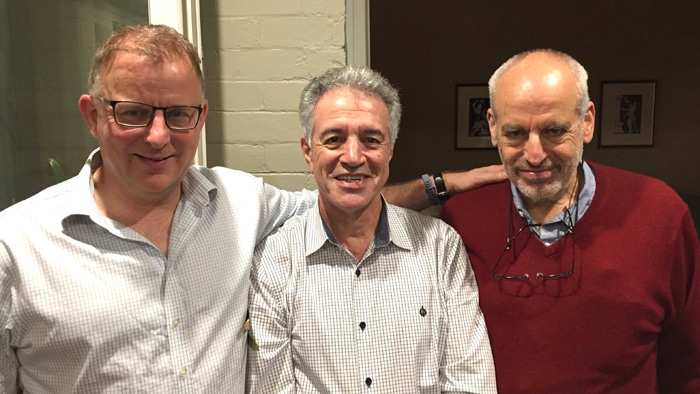
He runs a shared email service (listserv) which has been an extraordinary asset in sharing information among vaping advocates and he has played a major role in advocating in many countries with submissions, letters and personal visits. And all of this he does in his own time and at his own expense. I have learned an enormous amount from him. Go Clive!
What would be a campaign you would love to start if there were no obstacles?
Youth vaping is being weaponised as a cynical and emotional tactic to undermine vaping policy. We now have enough evidence to know that frequent vaping by non-smoking youth is rare, it is not a gateway to smoking. In fact it is diverting kids away from smoking and is beneficial overall. We need to accept that this is just another relatively benign risk-taking behaviour that some kids will try and that overall does little harm.
On the youth panel at GTNF23 yesterday I explained that the hype about youth #vaping was driving policy, instead of evidence
Brian King, Director of @FDATobacco was not amused
I am pleased to say he knew about my book, but I doubt he has read it! pic.twitter.com/KSE0r1nQzc— Dr Colin Mendelsohn (@ColinMendelsohn) September 22, 2023
I think a campaign to correct the misperceptions and fear mongering about youth vaping is vital from a strategic point of view and could help to reverse the opposition to vaping.
What is your proudest moment in your advocacy career?
Amongst all the failures and frustrations, starting ATHRA was very satisfying. It sent a clear message that there was credible opposition to the mainstream anti-vaping narrative and it had some successes in spreading an evidence-based message.
I am also proud of having organised leading Australian and international vaping advocates to sign letters which we sent to Health Ministers and policymakers, showing that there is broader, expert support for a different view.
We wrote to all political parties about vaping recently
Senator @MRobertsQLD wrote back reaffirming @OneNationAus support for sensible regulation of #vaping products as adult consumer goods, to “reduce tobacco-related harm and deaths”
Read their policyhttps://t.co/fNWTs4zL5b… pic.twitter.com/4lVBa69Nr5
— Dr Colin Mendelsohn (@ColinMendelsohn) September 29, 2023
I also led reviews of two government funded anti-vaping reports in Australia which found the reports to be scientifically flawed and contain misinformation and bias. The co-authors of the NHMRC report included many leading international experts, such as Professors Anne McNeill, John Britton and Neal Benowitz. These were published in peer-reviewed journals and have given us some ammunition against the relentless attacks against vaping.
I am also quietly proud of my book, Stop Smoking Start Vaping. I have had lots of good feedback and I am always delighted when I hear it has helped someone. The book outlines the scientific evidence around vaping and is a practical guide for smokers on how to get started. It also address the controversies about vaping, most of which do not stand up to careful analysis.
Who (or W.H.O. hahaha) is the biggest enemy when it comes to tobacco harm reduction?
The World Health Organisation (WHO) has lost all credibility on tobacco harm reduction. It is especially scandalous that WHO is exploiting its position as a trusted health authority and has done untold damage to public health in low and middle income countries. It is especially disgraceful that they have been bought out by Bloomberg Philanthropies and other funding organisations and have put money before public health.
The mainstream media has also been a big disappointment and must take a large share of the responsibility for the rampant misinformation about vaping. Alarmist clickbait stories of rare or exaggerated risks take priority over inspiring stories of people whose lives have been transformed by vaping or positive findings from research. Misinformation is often regurgitated uncritically, often without balance or context. It is no wonder that the public is grossly misinformed about the real risks and benefits. In the end, if these stories discourage smokers from switching to vaping, they will cost lives.
Australian anti-vaping researcher-activists repeatedly try to censor publications and presentations that support #vaping with baseless and personal attacks. It is a sure sign that they have lost the evidence debate
My account of some recent events
https://t.co/reXH3cgwF8…
— Dr Colin Mendelsohn (@ColinMendelsohn) August 29, 2023
Is there a message you would like to give our readers?
My advice to vapers is to follow the evidence. If you are a former smoker who vapes, don’t quit unless you are confident you will not relapse to smoking. The precise-long term risks will not be known for decades but are highly likely to be far less than from smoking. Be very cautious about what you read in the media and seek reliable sources for information, such as Action on Smoking and Health UK (ASH), the National Health Service (NHS) and Cancer Research UK (CRUK) if you have queries.
Vapers also need to be more mindful of the environmental harm of single use vapes. Not only is this bad for the planet, but it gives opponents more ammunition to use against vaping. Vapes should always be disposed of in battery recycling boxes, never discarded as litter or placed in garbage bins.
Vaping has an image problem and vapers need to be courteous and discreet in public. Ask for permission before you vape around other people. Blowing large clouds is not a good look and creates a negative impression. Vapers have a right to vape, but other people have a right to fresh air, even though there is no evidence that second-hand vapour is harmful.
Finally if you could give an “Ecigclick Award” to any person, product or company in the vaping industry / advocacy circle – who / what would it be?
There are so many who work tirelessly to promote vaping to benefit others. I can’t go past Clive Bates, but close runners up include Alex Wodak from Australia, Louise Ross, Martin Cullip and Gerry Stimpson from the UK, Charles Gardner from the US, David Sweanor from Canada and Nancy Loucas from New Zealand.
More Information On Vaping From Colin
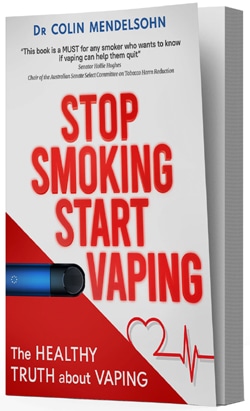
On his website, there are 46 vaping FAQs which are kept up to date here.
Colin’s book “Stop Smoking Start Vaping” is a useful evidence-based resource on vaping, how to switch from smoking and the controversies around vaping, such as youth vaping and the role of Big Tobacco.
The e-book is now available for free download from the website here.
More information about the book and how to purchase a paperback version is available here.
Thank You Colin
I would like to thank Colin so so much for taking the time out of his hectic schedule to talk to me.
All of us reading this are loving your work! Plus many of us (especially me!) wonder how you manage to do so much! My brain would cave in with your workload!
Visit Colin’s website here – https://colinmendelsohn.com.au/
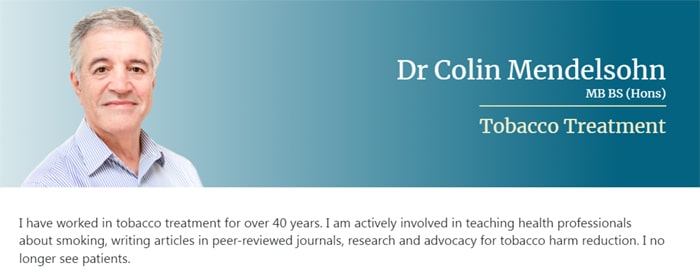
Get in touch with Colin on social media:
Twitter / X: ColinMendelsohn
Facebook: dr.colin.mendelsohn
LinkedIn: https://www.linkedin.com/in/dr-colin-mendelsohn-a6367262/
He can also be contacted by email at mendel@bigpond.net.au
The post Colin Mendelsohn Chats To Ecigclick!! appeared first on Ecigclick.











